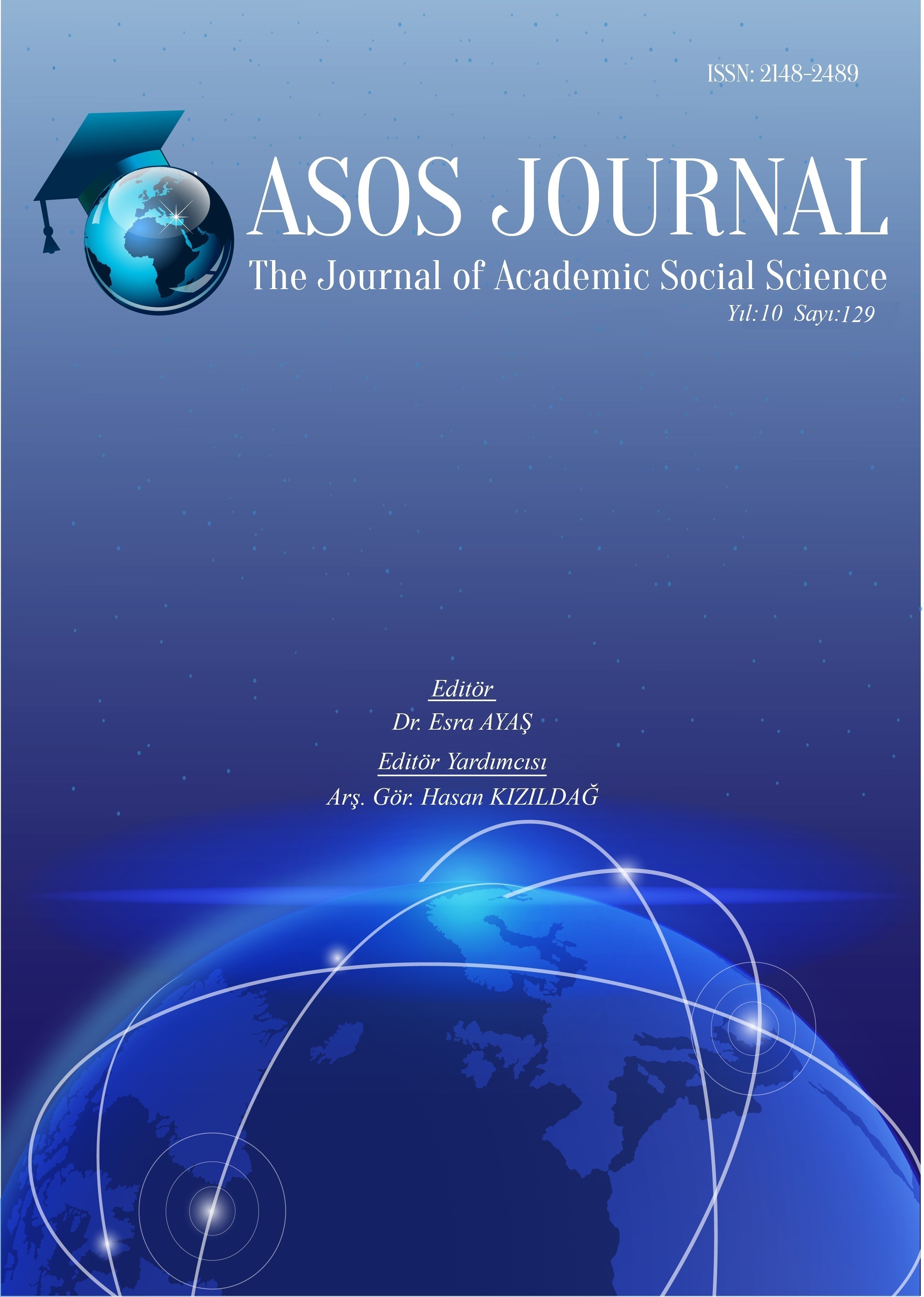Author :
Abstract
Çatışmalar, bireyler veya gruplar arasında ortaya çıktıkları için her yerde ve her zaman vardır. Çatışmalar insani olduğu için, toplumların küçük birimleri olan eğitim örgütlerinin bünyelerinde daima var olmaktadırlar. Eğitim örgütlerinin başarısı, büyük ölçüde yöneticilerinin yönetsel becerilerine bağlıdır ve bu nedenle çatışma yönetimi tekniklerini edinmek çok önemlidir. Eğitim yöneticileri, çatışmanın tam manasını anlamaya başlayarak, düzenli olarak planlanmış ve uygulanan mesleki eğitimler sayesinde çatışmalarla yapıcı bir şekilde başa çıkabilmektedir. İlgili literatür, bu yöneticilere yönelik bu tür düzenlenmiş çatışma yönetimi eğitimlerinden ve çeşitli araştırmalardan elde edilen olumlu sonuçlardan bahsetmektedir. Olumsuz etkileri en aza indirmek için eğitim yöneticilerinin yanı sıra veliler, öğretmenler ve öğrenciler gibi diğer paydaşlara da bu eğitimler verilmelidir.
Keywords
Abstract
Conflicts exist everywhere and at all times since they appear between individuals or groups of individuals. Since conflicts are human, educational organizations as small units of societies always have conflicts within their bodies. The success of educational organizations heavily depend on the managerial skills of their administrators and this is why acquiring conflict management techniques is essential. By beginning to understand the full meaning of conflict, educational administrators could achive dealing with conflicts constructively with the help of regularly planned and applied professional trainings. The related literature mentions such organized conflict management trainings aimed at those administrators and their positive results from a variety of researches. As well as educational administrators, other stakeholders such as parents, teachers and also students should be offered these trainings so as to minimize negative effects.
Keywords
- Cambridge Online Dictionary (2022). https://dictionary.cambridge.org/tr/s%C3%B6zl%C3%BCk/ingilizce/conflict Accessed 23 April 2022
- Caputo, A., Marzi, G., Maley, J. & Silic, M. (2018). Ten years of conflict management research 2007 – 2017 An update on themes, concepts and relationships. International Journal of Conflict Management, 30 (1), 87 – 110. https://www.researchgate.net/publication/327222160_Ten_years_of_conflict_managem ent_research_2007-2017_An_update_on_themes_concepts_and_relationships
- Ertürk, R. (2022). Conflict in schools: a qualitative study. Participatory Educational Research, 9 (1). 251 – 270. https://dergipark.org.tr/en/download/article-file/1657226
- Everard, K. B. & Morris, G. (2002). Effective School Management. Paul Chapman Publishing Ltd.
- Ghaffar, A. (2009). Conflict in schools: Its causes & management strategies.Journal of Managerial Sciences, 3 (2), 212 – 227. https://www.qurtuba.edu.pk/jms/3_2.htm
- Isa, A. A. (2015). Conflicts in organizations: causes and consequences. Journal of Educational Policy and Entrepreneurial Research, 2 (11), 54 – 59. https://www.researchgate.net/publication/311558401_Conflicts_in_Organizations_Caus es_and_Consequences
- Jones, T. S. (2004). Conflict resolution education: the field, the findings, and the future. Conflict Resolution Quarterly, 22 (1-2), 233 – 267. https://www.creducation.net/resources/Jones_Article.pdf
- Larasati, R. & Raharja, S. (2019). Conflict management in improving schools effectiveness. Advances in Social Science, Education and Humanities Research, 397, 191 – 197. https://www.researchgate.net/publication/339224102_Conflict_Management_in_Impro ving_Schools_Effectiveness
- Madalina, O. (2016). Conflict management, a new challenge. Procedia Economics and Finance, 39, 807 – 814.https://core.ac.uk/download/pdf/82735654.pdf
- McKibben, L. (2017). Conflict management: importance and implications. British Journal of Nursing, 26 (2), 2 – 5. https://www.researchgate.net/profile/LaurieMckibben/publication/313033706_Conflict_management_Importance_and_implication s/links/5d874cba458515cbd1b15221/Conflict-management-Importance-andimplications.pdf
- Mishra, L. (2013). Peace education as a tool for effective conflict management in secondary schools in Odisha. Sakarya University Journal of Education, 3 (1), 69 – 76. https://dergipark.org.tr/tr/download/article-file/192299
- Mohammed, U. K., White, G. RT, & Prabhakar, G. P. (2008). Culture and conflict management style of international project managers. International Journal of Business and Management, 3 (5), 3 – 11. https://www.researchgate.net/publication/41891175_Culture_and_Conflict_Managemen t_Style_of_International_Project_Managers
- Montes, C., Rodriguez, D. & Serrano, G. (2012). Affective choice of conflict management styles. International Journal of Conflict Management, 23 (1), 6 – 18. https://www.researchgate.net/publication/254188790_Affective_choice_of_conflict_ma nagement_styles#:~:text=Findings%20%E2%80%93%20Results%20reveal%20that%2 0affective,preference%20for%20more%20cooperative%20strategies
- Msila, V. (2012). Conflict management and school leadership. Journal of Communication, 3 (1), 25 – 34. https://www.researchgate.net/publication/233868808_Conflict_Management_and_Scho ol_Leadership
- Omisore, B. O. & Abiodun, A. R. (2014). Organizational conflicts; causes, effects and remedies. International Journal of Academic Research in Economics and Management Sciences, 3 (6), 118 – 137. https://www.researchgate.net/publication/273493998_Organizational_Conflicts_Causes _Effects_and_Remedies
- Oresajo, N. O. (2015). Conflict management in school organisation in Nigeria. International Journal of Development and Management Review, 10, 166 – 175. https://www.ajol.info/index.php/ijdmr/article/view/120975
- Putra, F. D. & Smolak, S. (2020). Harmony communication in peace language and conflict resolution. International Journal of Communication and Society, 2 (2), 86 – 93. https://www.researchgate.net/publication/343969850_Peace_language_and_conflict_res olution_in_harmony_communication/fulltext/5f4a8f10299bf13c505243d4/Peacelanguage-and-conflict-resolution-in-harmony-communication.pdf
- Shanka, E. B. & Thuo, M. (2017). Conflict management and resolution strategies between teachers and school leaders in primary schools of Wolaita Zone, Ethiopia. Journal of Education and Practice, 8 (4), 63 – 74. https://files.eric.ed.gov/fulltext/EJ1133021.pdf
- Tjosvold, D., Wong, A. S. H. & Chen, N. Y. F. (2014). Constructively managing conflicts in organizations. The Annual Review of Organizational Psychology and Organizational Behavior, 1, 545 – 568. https://www.annualreviews.org/doi/abs/10.1146/annurevorgpsych-031413-091306
- To, A. T., Tran, T. S., Nguyen, K. O., Hoang, V. T. & Thai, K. P. (2021). Applying conflict management styles to resolve task conflict and enhance team innovation. Emerging Science Journal, 5 (5), 667 – 677. https://www.ijournalse.org/index.php/ESJ/article/view/546/pdf
- Turesky, E. F., Smith, C. D. & Turesky, T. K. (2020). A call to action for virtual team leaders: practitioner perspectives on trust, conflict and the need for organizational support. Organization Management Journal, 17 (4/5), 185 – 206. file:///C:/Users/Fsm/Desktop/AKADEM%C4%B0K%20DERG%C4%B0LER/2021%2 0-%202022/ASOS%20- %20THE%20JOURNAL%20OF%20ACADEMIC%20SOCIAL%20SCIENCE/%C3% 87ATI%C5%9EMA%20Y%C3%96NET%C4%B0M%C4%B0/SOURCES/CONCEP~ 1/TURESK~1.PDF
- Uzun, T. & Ayık, A. (2017). Relationship between communication competence and conflict management styles of school principals. Eurasian Journal of Educational Research, 68, 167 – 186. https://eric.ed.gov/?id=EJ1148906#:~:text=It%20showed%20that%20the%20communic ation,styles%20at%20a%20medium%20level
- Walton, R. E. (1999). Managing conflict in organizations. M. Crawford, L. Kydd & C. Riches (Eds.), in Leadership and Teams in Educational Management (pp. 110 – 115). Open University Press.





